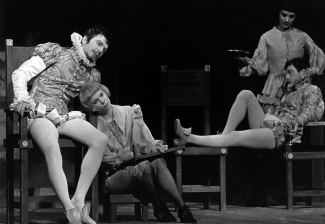Twelfth Night
For his first Shakespearean stage production in 27 years, Bergman asked set designer Gunilla Palmstierna-Weiss to construct the interior of an Elizabethan house in which dome players had set up a little platform, with William Shakespeare himself welcoming the audience.

'A sterling theatrical performance, executed with an artistic vitality and scenic imagination that were entirely hynotising; a festive evening for fools by fools.'Leif Zern, Dagens Nyheter
About the production
Bergman stressed the sensuality and sexual ambiguity built into the part of the androgynous Voila/Cesario characters and staged the play with a great deal more explicit erotic and sensuous cavorting than Shakespeare suggests.
Bergman added an aftermath to the final scene: the different couples whirled around to music, stopped in the middle of the dance and found themselves hand in hand with the wrong partner. Music was prominent in this production with the musicians present in the music gallery throughout the play. The musical compositions consisted of a form of Elizabethan pastiche.
Twelfth Night was Bergman's last production on the Swedish stage for nine years. The following year, in 1976, he left Sweden because of an apparent 'tax affair'. He returned to the Swedish stage and The Royal Dramatic Theatre with another Shakespeare play, King Lear.
Sources
- The Ingmar Bergman Archives.
- Birgitta Steene, Ingmar Bergman: A Reference Guide, (Amsterdam University Press, 2005).
- Birgitta Steene, Ingmar Bergman: A Reference Guide, (Amsterdam University Press, 2005).
Poland, Warsaw, Theatre of Nations, 14-17 June 1975.
There were three sold-out performances. Polish reviewers...maintained an awesome respect for Bergman whom they elevated to a philosopher of rank, seeing his production of Twelfth Night as 'one more piece of material in his existential search'. (Balicki)
Collaborators
- Bibi Andersson, Viola
- Lil Terselius, Olivia
- Jan-Olof Strandberg, Malvolio
- Solveig Ternström, Maria
- Ingvar Kjellson
- Heinz Hopf, Orsino
- Ulf Johanson, Tobias Rap
- Sven Lindberg, Andreas Blek af Nosen
- Jonas Bergström, Sebastian
- Lauritz Falk, Antonio
- Birger Malmsten
- Göran Graffman, Curio
- Jan Jönsson, Valentin/Fabian
- Olle Hilding, Minister
- Segol Mann, Guard 1
- Jan Nyman, Guard 2
- Beata Bergström, Stills photographer
- William Shakespeare, Author
- Arne Hertler, Stage manager
- Donya Feuer, Choreography
- Klas Möller, Lighting design
- Daniel Bell, Music
- Ingegerd Sundstedt, Make-up and wigs
- Marianne Lundh, Make-up and wigs
- Arne Lundh, Make-up and wigs
- Maria Hedermo, Make-up and wigs
- Agneta Pauli, Producer
- Ingmar Bergman, Director
- Katarina Sjöberg, Assistant director
- Gunilla Palmstierna-Weiss, Designer
- Holger Juhlin, Carpenter
- Britta Olin, Prompter
- Bernt Thorell, Technician
- Allan Bergstrand, Translation